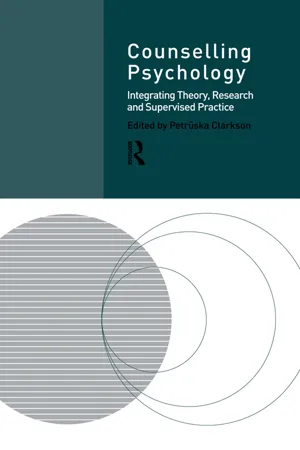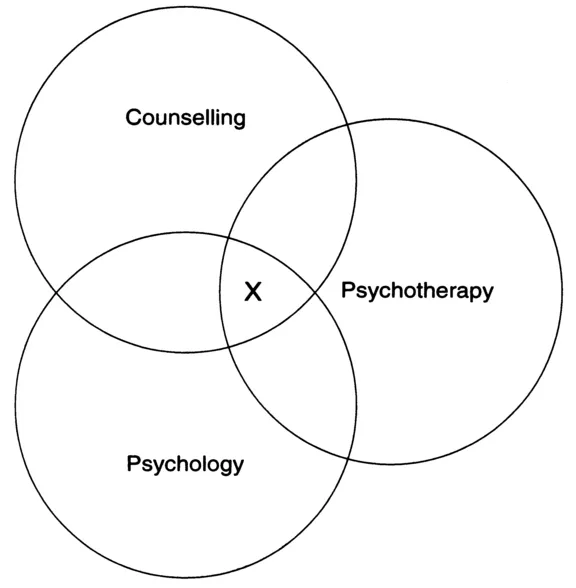![]()
Chapter 1
Counselling psychology
The next decade1
Petrūska Clarkson
Introduction
In this chapter a brief but necessary review of the boundary and definitional concerns which most affect the discipline of counselling psychology (Part I) is followed by an overview of what our future could look like (Part II).
Part I: Counselling Psychology - What is it?
The issues, concepts and disputes of disciplinary demarcations between the designations psychologist, counsellor and psychotherapist have been exhaustively discussed elsewhere and will no doubt continue in many voices. Three factors may change this preoccupation: (a) the legal protection of the term psychologist as currently being mooted by the British Psychological Society (BPS); (b) the possibility of a more generic training for all psychologists; and (c) the outcome of initiatives to establish a special designation of psychotherapist psychologist (or similar).
For our purposes here, acknowledging that there are vast areas of similarity, we will separate the descriptions of clinical and counselling psychologists as follows.
Psychologists and applied psychologists
Psychologists are professionals with at least one degree in psychology. Many move on to further postgraduate studies in applied psychology, one of which, these days, is counselling psychology.
The dictionary definition of psychology as 'the science of the nature, functions and phenomena of the human soul or mind' (Onions, 1968: 1700) is somewhat restrictive in its view. Psychology is not only the 'science of the mind' but also the science of human behaviour in all its aspects. Psychology interprets the person (Carroll and Pickard, 1993) and results in a number of theories of personality and research methods for understanding the person. Its questions are person-related: Why do people behave the way they do? "What motivates the individual? How do people grow and begin to think and use language? Can we isolate stages of life as individuals progress towards old age? From its academic base, psychology is divided into a number of subsections, such as development psychology, cognitive psychology, personality theory, biological basis of behaviour. abnormal psychology, psychological assessment. From this academic basis, psychologists move to apply their subject to the world.
Clinical psychologist
The key tasks of clinical psychologists are: Assessment, Treatment, Training/teaching and Research (both patient and service related) as well as Management (BPS, 1988b: 4).
The range of treatment techniques has grown considerably during the last twenty years, from the previously limited range of essentially educational or psychodynamic techniques.... Examples are the treatment of elimination disorders in children, phobic conditions in adults and the remediation of cognitive difficulties following different types of brain injury. Some of these treatments now offer positive alternatives to drug treatments (such as anxietymanagement procedures), and supplement medical treatments in people with long-term-disabling conditions (BPS, 1988a: 5).
Behavioural methods (such as desensitisation), methods based on social learning principles (such as social skills training) and cognitive methods, used especially for altered mood states, are now widely used. In addition, a wider range of psychotherapeutic approaches has been developed, based on theories that are not essentially psychodynamic (such as personal construct theory). It has become apparent that there are a number of non-specific factors which are relevant to many apparently different techniques. A number of these approaches are used by counsellors and other non-psychologists to help people with less serious conditions (BPS, 1988a: 5).
The boundaries between clinical psychology as a discipline and other academic and health-care disciplines, are not fixed (BPS, 1988a: 1).
Counselling psychologist
This has become an avenue to chartered psychologist status and an independent Division of the BPS. At the time of writing it is a Special Group of the BPS, as Carroll (1992: 74) makes clear:
Counselling psychology moved from being a 'Section' in 1982 to becoming a 'Special Group' in 1988 with increasing aspirations to becoming a Division within BPS. Its membership ... is still probably the fastest-growing section of the BPS.... Becoming a Division within the BPS would bring with it major implications for training, training courses, career structure and pay levels, status, and supervision. A proposed new Diploma in Counselling has been outlined as the next step on the journey to Division status.
One important, if not the most important, difference between counsellors and counselling psychologists is the conscious use of academic psychology alongside practical counselling skills. Counselling psychologists have a basic degree in psychology, and then further training in counselling psychology (MSc). Counselling psychology is here conceptualised as the overlapping area between counselling and psychotherapy in the Venn diagram (see Figure 1.1, p. 6) representing the three primary arenas of counselling, psychology and psychotherapy.
Counselling psychology is considered not identical with counselling (even when it is carried out by psychology graduates). In counselling psychology, there is an emphasis on the systemic application of distinctively psychological understanding. based on empirical research of the client and the counselling process, to the practice of psychological counselling. The relevant psychological knowledge is partly concerned with the presenting problems of clients, and partly with the procedures and processes involved in counselling. It would be remembered that counselling psychology involves work in an organisational context, as well as with individual clients, and synthesises elements of better-developed areas of professional work such as clinical and occupational psychology. Life-span developmental psychologies and the social psychology of interpersonal processes are among the areas that supply the academic foundations of counselling psychology. Of central scientific relevance, of course, are empirical investigations of the processes and outcomes of counselling and of related methods of psychotherapy.
The psychological understanding of counselling derives not only from formal psychological inquiry but also from the interpersonal relationships between practitioners and their clients. The essence of such relationships is one of personal exploration and clarification in which psychological knowledge is utilised and shared in ways which enable clients to deal more effectively with their inter- and intra-personal concerns. The capacity to establish and maintain such relationships ultimately rests upon the personal qualities and maturity of the individual counselling psychologist. Personal qualities, such as non-defensiveness and a capacity to experience and communicate emphatic resonance, constitute essential resources which the counselling psychologist draws upon. Whilst these characteristics may be enhanced by skills training they derive primarily from a foundation of personal experience and integrative maturity (BPS, 1989: 1).
Having made some distinctions between counselling and clinical psychologists, we now address common descriptions of two other professions which interlink and overlap in terms of many variables.
Counsellor
The British Association for Counselling, founded in 1977, defines counselling as follows:
Counselling is the skilled and principled use of relationship to facilitate selfknowledge, emotional acceptance and growth, and the optimal development of personal resources. The overall aim is to provide an opportunity to work towards living more satisfyingly and resourcefully. Counselling relationships will vary according to need but may be concerned with developmental issues, addressing and resolving specific problems, making decisions, coping with crisis, developing personal insights and knowledge, working through feelings of inner conflict or improving relationships with others.
The counsellor's role is to facilitate the client's work in ways that respect the client's values, personal resources and capacity for self determination (BAC, 1989: 1).
Psychotherapist
'Legislators and courts of law have found it almost impossible to define "psychotherapy" in such a way as to include, by universal agreement among therapists, that which is psychotherapy and to exclude that which is nor psychotherapy' (Watkins, 1965: 1142). The professional body for psychotherapists is the United Kingdom Council for Psychotherapy (UKCP).
Here follow some definitions of psychotherapy:
Psychotherapy is defined as a form of treatment for mental illness and behavioural disturbances in which a trained person establishes a professional contact with the patient and through definite therapeutic communication, both verbal and non-verbal, attempts to alleviate the emotional disturbance, reverse or change maladaptive patterns of behaviour, and encourage personality growth and development. Psychotherapy is distinguished from such other forms of psychiatric treatment as the use of drugs, surgery, electric shock treatment and insulin coma treatment. (Freedman, Kaplan and Shadock, 1985: 2601).
Psychotherapy is the treatment by psychological means of problems of an emotional nature in which a trained person deliberately establishes a professional relationship with a patient with the object of 1) removing, modifying or retarding existing symptoms, 2) mediating disturbed patterns of behaviour, 3) promoting positive personal growth and development (Wolman, 1965: 118).
In discussions at the United Kingdom Standing Conference for Psychotherapy (as the UKCP used to be known), the following definition of psychotherapy had been used: 'the systematic use of a relationship between therapist and patient — as opposed to pharmacological or social methods - to produce changes in cognition, feelings and behaviour' (Holmes and Lindley, 1989: 3).
In the UKCP, the Psychotherapy Training Organisations are currently divided into the following sections:
- Analytic Psychotherapy Section;
- Humanistic and Integrative Psychotherapy Section (HIPS);
- Family, Marital, and Sexual Section;
- Experiential Constructivist Therapy;
- Behavioural Psychotherapy Section;
- Hypnotherapy Section;
- Psychoanalytically-based Psychotherapy with Children Section;
- Analytical Psychology.
It should be clear that membership of all of these divisions (with the exception of 3) is made on the grounds of avowed and practised adherence to one or more theoretical orientations.
Figure 1.1 shows each of the three areas - counselling, psychology and psychotherapy - as distinct in itself, but relating to each of the other two areas, and indicates the interrelationship between all three. The overlap between counselling and psychotherapy represents the work of counselling professionals with advanced practice qualifications or the psychotherapist using counselling skills. The overlap between psychotherapy and psychology represents psychotherapists with a psychology qualification or psychologists trained as psychotherapists. The overlap between counselling and psychology represents counselling psychologists (i.e. psychology graduates with counselling qualifications, but no special training in psychotherapy). Finally, 'X' marks the area which involves the work of psychology graduates who have training and experience in both counselling and psychotherapy. This may be the appropriate area for the profession of counselling psychology.
Research (Norcross, 1986) shows that theoretical differences between 'schools or approaches' are far less important in terms of successful outcome of counselling or psychotherapy than the quality of the relationship between counsellor and client and certain client characteristics, including motivation for change and the willingness to take responsibility for their part in the process. The literature and an extensive twenty-year-long qualitative research project is reviewed, discussed and amplified, for example, in Clarkson (1991, 1995a) and Chapter 5 of this volume.
Figure 1.1 Venn diagram of the relationship between counselling, psychology and psychotherapy
Source P. Clarkson and M. Pokorny (eds) Handbook of Psychotherapy, London: Routledge, 1994.
Part II: Counselling Psychology - The Future
In this part of the chapter, originally written in response to a specific assignment, I will survey some of the major trends developing in counselling psychology, which may shape the future of the profession into the next decade. For purposes of consideration rather than an attempt at spurious demarcation, the major themes of the discussion will be organised under the four headings of Professionalism, Theory. Practice and Research. I will use a device of polarisation to highlight the major issues as I see them now. It is not meant to be comprehensive or definitive. but a spur towards exploration, debate and development.
Professionalism
Counselling psychology has comparatively recently emerged as a separate profession in Britain, largely in response to pervasive and large-scale changes in the socio-economic, political and cultural forces affecting the helping professions. Some of these are the aftermath of the Thatcher years (such as what has been experienced as the dismantling of the National Health Service), the restructuring of care and medicine in terms of market forces and the popularization (through books, radio and TV) of self-development and counselling both as a resource as well as a career opportunity for many people of the middle classes in these uncertain times. (It has been one of the few professions relatively untouched by the recession and counselling schools have flourished while city firms and industry have languished and suffered.)
Quantity and quality
Emerging thus as a profession for and from our times, counselling psychology can bo...

